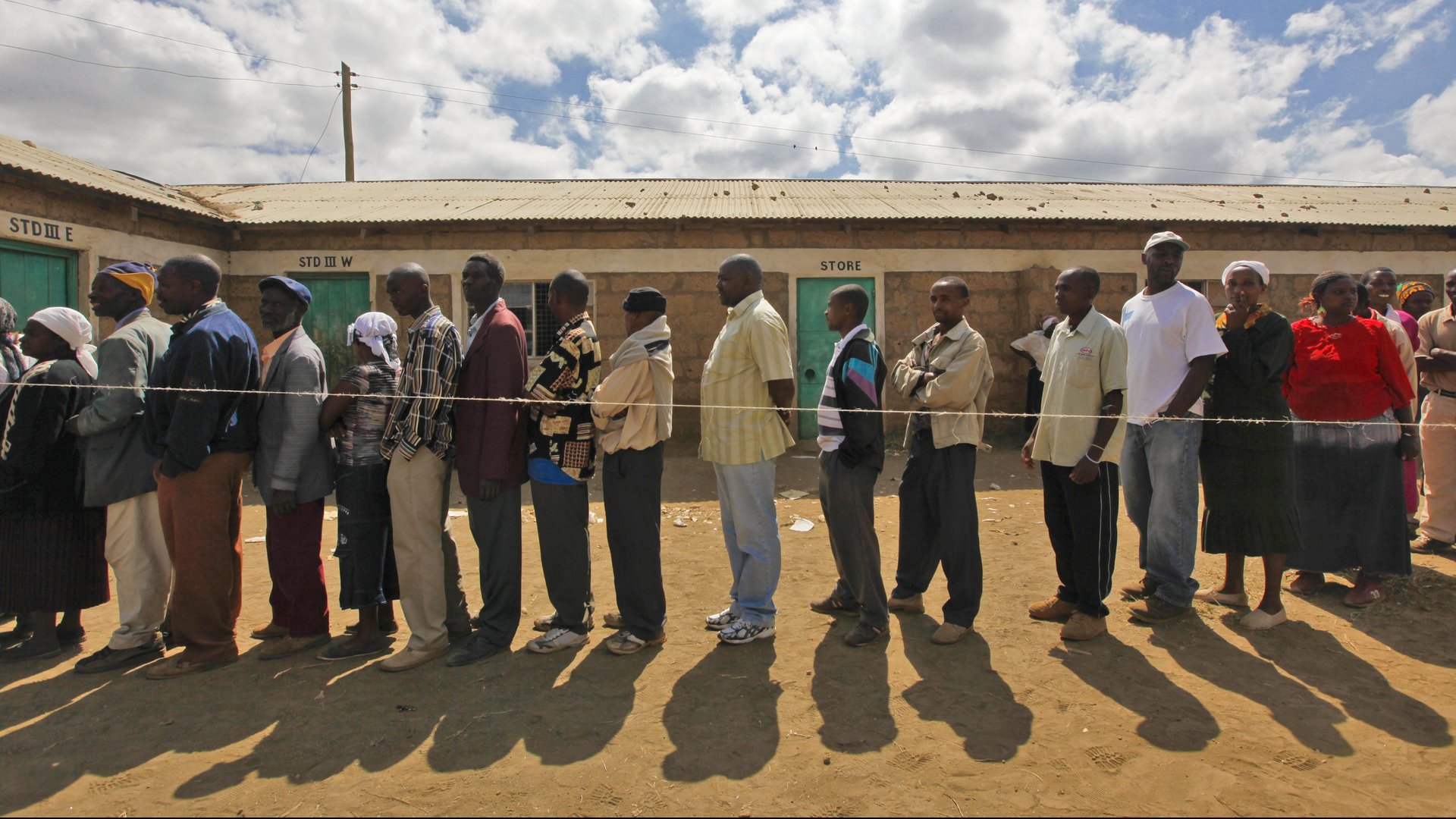These four pivotal elections in Africa will keep democracy watchers busy for the rest of 2017
This year, there’ll be four pivotal elections across the continent—namely, in Kenya, Rwanda, Angola (all in August) , and Liberia (October). These general and presidential elections could reshape not only the political institutions in these nations but are also likely to have an impact on peace and security, governance, development and economic growth.


This year, there’ll be four pivotal elections across the continent—namely, in Kenya, Rwanda, Angola (all in August) , and Liberia (October). These general and presidential elections could reshape not only the political institutions in these nations but are also likely to have an impact on peace and security, governance, development and economic growth.
The fear of ethnic-induced violence in Kenya, the angst around the succession plan in Rwanda, the end of the world’s longest running presidencies in Angola, and the task of replacing Africa’s first female president Ellen Johnson Sirleaf in Liberia will all be significant milestones, indicative of where Africa’s electoral politics goes from here.
Rwanda (Aug. 4)
In late May, president Paul Kagame gave his strongest hint yet that he could step down after the upcoming August elections. Elected in 2003 with more than 95% of the vote, Kagame has in the past promised to leave office, especially if he didn’t build national institutions that would allow him to preside over a peaceful transfer of power. But that will be a step easier said than done.
Some Rwandans assert a third term would allow Kagame to consolidate the socioeconomic and technological progress the country has achieved under his leadership. Others argue that Kagame and his party, the Rwandan Patriotic Front (RPF), have used the memory of the genocide to limit competitive politics and undermine dissent. In fact, other observers have warned that keeping Kagame in office could produce violence in the future, and could push rivals to extricate him.
Edward Paice, the director of the Africa Research Institute, says the situation will become clearer closer to the 2024 elections. A Putin-Medvedev-style shuffle was speculated, Paice says, but nothing was put into effect—showing that even if he stands down, Kagame “will still remain a central figure in [Rwandan] politics.”
Kenya (Aug. 8)
As a regional economic powerhouse, transport hub with a relatively open democracy, Kenya’s elections attract attention well beyond its borders. In its 2013 election, more than 23,000 local and international observers monitored the Kenyan election.
The 2017 Kenyan presidential elections will be another two-horse race between Raila Odinga and the incumbent Uhuru Kenyatta. Since the bloody aftermath of the 2007 elections, Kenya has adopted a progressive constitution that devolved the system of power and mandated the distribution of resources to counties. But the biggest challenge facing the country, observers say, is the weakness of key institutions like the electoral commission. The Independent Electoral and Boundaries Commission was only sworn in January—a breach of recommendations that outlined commissioners be in office two years in advance. Polls also show that the Kenyan public doesn’t trust the Supreme Court to handle an election petition if the results are contested by either party.
Murithi Mutiga, senior Horn of Africa analyst with the International Crisis Group, says that this means “the potential for a contested outcome … resulting in inter-communal conflict or violent street protests remain high.”
Angola (Aug. 23)
On Saturday (June 3), thousands of Angolans protested in the streets of the capital Luanda to demand free and fair elections. After 38 years in power, president Jose Eduardo dos Santos will step down, with defense minister João Lourenco emerging as the chosen successor.
The election is set to mark a significant turn for the oil-rich nation, which has been ruled by one party since independence in 1975. Since he ascended to the presidency, dos Santos has been accused of crushing dissent, appointed his daughter—Africa’s richest woman—to lead the state oil company, and his son to head the nation’s $5 billion sovereign wealth fund.
But Lourenco is set to inherit a country struggling with low oil prices, rising inflation rates, and increasing poverty. And those expecting radical change might be disappointed. “Power in the country will remain in the hands of the military because Lourenco is a general,” Nuno Dala, an opposition activist, said.
Liberia (Oct. 10)
Africa’s oldest republic heads to the polls in October to elect a leader to succeed president Ellen Johnson Sirleaf. So far, 11 candidates have registered including Alexander Cummings, a former Coca-Cola executive; vice president Joseph Boakai; and former football star George Weah. All the candidates say they want to deal with poverty and unemployment, tackle widespread health problems including Ebola risk, and improve infrastructural development.
The race also features one woman, an ex-model who wants to be the country’s second female president. MacDella Cooper is running on a five-point platform that hopes to provide free education for all, universal health care, electricity in every home, decentralizing governance, and dealing with land ownership.